51.1.2.3.4.5.6 (51 > 57)
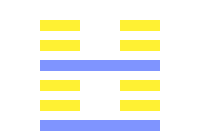
51.1.2.3.4.5.6 (51 > 57) - THE KĂN HEXAGRAM.
- 1. The first line, undivided, shows its subject, when the movement approaches, looking out and around with apprehension, and afterwards smiling and talking cheerfully. There will be good fortune.
- 2. The second line, divided, shows its subject, when the movement approaches, in a position of peril. He judges it better to let go the articles (in his possession), and to ascend a very lofty height. There is no occasion for him to pursue after (the things he has let go) ; in seven days he will find them.
- 3. The third line, divided, shows its subject distraught amid the startling movements going on. If those movements excite him to (right) action, there will be no mistake.
- 4. The fourth line, undivided, shows its subject, amid the startling movements, supinely sinking (deeper) in the mud.
- 5. The fifth line, divided, shows its subject going and coming amidst the startling movements (of the time), and always in peril ; but perhaps he will not incur loss, and find business (which he can accomplish).
- 6. The topmost line, divided, shows its subject, amidst the startling movements (of the time), in breathless dismay and looking round him with trembling apprehension. If he take action, there will be evil. If, while the startling movements have not reached his own person and his neighbourhood, (he were to take precautions), there would be no error, though his relatives might (still) speak against him.
51.1.2.3.4.5.6 (51 > 57) - Shock
One apologises profusely so as not to have to do more chores.
Bing DeepL Google Yandex51.1.2.3.4.5.6 (51 > 57) - Shock
One apologizes profusely so as not to have to do more chores.
Bing DeepL Google Yandex51.1.2.3.4.5.6 (51 > 57) - Kán, l’ébranlement
Kán : tonnerre, effroi répandu, crainte.
- 1. Le tonnerre approchant, on est plein d’effroi ; puis, quand il est passé, on sourit et on parle tous ensemble (on passe de la crainte à la joie).
- 2. Quand le tonnerre gronde, le danger arrive, on croit devoir tout abandonner et se retirer en un lieu sûr et élevé. Qu’on ne s’obstine pas à rechercher alors ce qu’on a abandonné ; on le retrouvera quelque temps après. (Quand le danger sera passé.)
- 3. Le tonnerre émeut, agite ; il pousse à agir justement.
- 4. Le tonnerre approchant trouble et interdit [avant même l’éclair].
- 5. Le tonnerre allant et venant répand l’effroi ; mais on doit tâcher de ne pas abandonner les affaires entreprises. Même dans le danger pressant, on doit garder le milieu.
-
6. Le tonnerre répand l’effroi et fait partout regarder avec trouble et crainte. S’il atteint et frappe, il causera un grand mal. (Ou : il corrige le mal.) Mais s’il ne frappe ni tel personnage, ni ses voisins, ce ne sera point un mal et fera seulement jaser les habitants d’une même maison.
Quand le tonnerre gronde, que l’orage éclate, le sage recherche la cause de ce fait (et tâche de profiter de l’avertissement céleste).
51.1.2.3.4.5.6 (51 > 57) - Le choc
On se répand en excuses pour ne pas avoir à faire davantage de corvées.
Bing DeepL Google Yandex51.1.2.3.4.5.6 (51 > 57) - Megrázkódtatás
- 1. Nevethet miután meglátja.
- 2. Ne keresse ami elveszett.
- 3. Meglátva a szakadást otthagyja őket.
- 4. Meg kell szabadítania magát a többiektől mielőtt tovább mehetne.
- 5. Szilárdan áll a megrázkódtatás kezdetekor és végigkíséri a többieket míg véget nem ér.
- 6. Elvesztette a leggyengébbet, visszafogottnak kell maradnia míg nem változnak.
Les trigrammes
Les trigrammes sont des combinaisons de trois traits yin et yang. Dans l'hexagramme, les trois traits du dessous constituent le trigramme inférieur et représentent la situation intérieure. Les trois lignes du haut constituent le trigramme supérieur et représentent la situation extérieure.
Trigramme supérieur : Le tonnerre Le vent


Trigramme inférieur : Le tonnerre Le vent


La formation: 51
What is already there
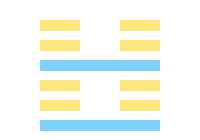
51 - THE KĂN HEXAGRAM.
Kăn gives the intimation of ease and development. When (the time of) movement (which it indicates) comes, (the subject of the hexagram) will be found looking out with apprehension, and yet smiling and talking cheerfully. When the movement (like a crash of thunder) terrifies all within a hundred lî, he will be (like the sincere worshipper) who is not (startled into) letting go his ladle and (cup of) sacrificial spirits.
Bing DeepL Google Yandex51 - Shock
Something is coming which enables the identification of a problem.
Bing DeepL Google Yandex51 - Shock
Something is coming which enables the identification of a problem.
Bing DeepL Google Yandex51 - Kán, l’ébranlement
Kán : tonnerre, effroi répandu, crainte.
Kán« tonnerre, effroi se répandant, appréhension ». Le tonnerre survenant répand l’effroi ; par l’effroi, les rires et les causeries s’arrêtent court. Le tonnerre terrifie cent lis, mais ne doit pas arrêter la cuiller du sacrifice aux esprits (le sacrifice) 1.
1 Le tonnerre peut arrêter tout mais pas empêcher le sacrifice.
Texte
Le tonnerre approchant répand l’effroi ; les rires, les causeries s’arrêtent subitement. Le tonnerre terrifie cent lis, mais ne doit pas arrêter la cuiller du sacrifice aux esprits.
Commentaire
Cet effroi a d’heureux résultats. Les rires et les causeries gardent ainsi la mesure. Le tonnerre terrifie ce qui est loin comme ce qui est près. Mais on doit, quand même, garder le temple des ancêtres, les autels des génies du sol et présider aux sacrifices. (Malgré l’effroi, on ne peut les interrompre.)
Symbolisme
Le tonnerre répété forme l’hexagramme. Le sage, plein de crainte et de scrupules prudents, observe et corrige.
51 - Megrázkódtatás
Valami közelít ami lehetővé teszi a probléma felismerését.
Bing DeepL Google Yandex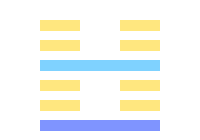
51.1 (51 > 16) - THE KĂN HEXAGRAM.
The first line, undivided, shows its subject, when the movement approaches, looking out and around with apprehension, and afterwards smiling and talking cheerfully. There will be good fortune.
Bing DeepL Google Yandex51.1 (51 > 16) - Kán, l’ébranlement
Kán : tonnerre, effroi répandu, crainte.
Le tonnerre approchant, on est plein d’effroi ; puis, quand il est passé, on sourit et on parle tous ensemble (on passe de la crainte à la joie).
Bing DeepL Google Yandex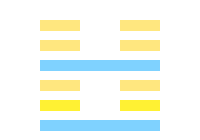
51.2 (51 > 54) - THE KĂN HEXAGRAM.
The second line, divided, shows its subject, when the movement approaches, in a position of peril. He judges it better to let go the articles (in his possession), and to ascend a very lofty height. There is no occasion for him to pursue after (the things he has let go) ; in seven days he will find them.
Bing DeepL Google Yandex51.2 (51 > 54) - Kán, l’ébranlement
Kán : tonnerre, effroi répandu, crainte.
Quand le tonnerre gronde, le danger arrive, on croit devoir tout abandonner et se retirer en un lieu sûr et élevé. Qu’on ne s’obstine pas à rechercher alors ce qu’on a abandonné ; on le retrouvera quelque temps après. (Quand le danger sera passé.)
Bing DeepL Google Yandex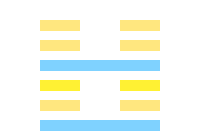
51.3 (51 > 55) - THE KĂN HEXAGRAM.
The third line, divided, shows its subject distraught amid the startling movements going on. If those movements excite him to (right) action, there will be no mistake.
Bing DeepL Google Yandex51.3 (51 > 55) - Kán, l’ébranlement
Kán : tonnerre, effroi répandu, crainte.
Le tonnerre émeut, agite ; il pousse à agir justement.
Bing DeepL Google Yandex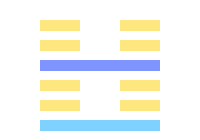
51.4 (51 > 24) - THE KĂN HEXAGRAM.
The fourth line, undivided, shows its subject, amid the startling movements, supinely sinking (deeper) in the mud.
Bing DeepL Google Yandex51.4 (51 > 24) - Being bogged down
One has to free oneself from others before one can go any further.
Bing DeepL Google Yandex51.4 (51 > 24) - Being bogged down
One has to free oneself from others before one can go any further.
Bing DeepL Google Yandex51.4 (51 > 24) - Kán, l’ébranlement
Kán : tonnerre, effroi répandu, crainte.
Le tonnerre approchant trouble et interdit [avant même l’éclair].
Bing DeepL Google Yandex51.4 (51 > 24) - Être embourbé
On doit se libérer des autres avant de pouvoir aller plus loin.
Bing DeepL Google Yandex51.4 (51 > 24) - Megrázkódtatás
Meg kell szabadítania magát a többiektől mielőtt tovább mehetne.
Bing DeepL Google Yandex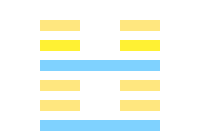
51.5 (51 > 17) - THE KĂN HEXAGRAM.
The fifth line, divided, shows its subject going and coming amidst the startling movements (of the time), and always in peril ; but perhaps he will not incur loss, and find business (which he can accomplish).
Bing DeepL Google Yandex51.5 (51 > 17) - Getting pushed around
One holds firm when the tremors begin, accompanies the others and endures them until they stop.
Bing DeepL Google Yandex51.5 (51 > 17) - Getting pushed around
One holds firm when the tremors begin, accompanies the others and endures them until they stop.
Bing DeepL Google Yandex51.5 (51 > 17) - Kán, l’ébranlement
Kán : tonnerre, effroi répandu, crainte.
Le tonnerre allant et venant répand l’effroi ; mais on doit tâcher de ne pas abandonner les affaires entreprises. Même dans le danger pressant, on doit garder le milieu.
Bing DeepL Google Yandex51.5 (51 > 17) - Se faire bousculer
On se tient fermement quand les secousses commencent, on accompagne les autres et on les endure jusqu'à ce qu'elles cessent.
Bing DeepL Google Yandex51.5 (51 > 17) - Megrázkódtatás
Szilárdan áll a megrázkódtatás kezdetekor és végigkíséri a többieket míg véget nem ér.
Bing DeepL Google Yandex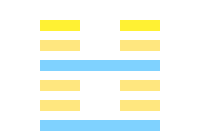
51.6 (51 > 21) - THE KĂN HEXAGRAM.
The topmost line, divided, shows its subject, amidst the startling movements (of the time), in breathless dismay and looking round him with trembling apprehension. If he take action, there will be evil. If, while the startling movements have not reached his own person and his neighbourhood, (he were to take precautions), there would be no error, though his relatives might (still) speak against him.
Bing DeepL Google Yandex51.6 (51 > 21) - Taking refuge in the heights
One has lost the weakest, so one keeps a low profile until they change.
Bing DeepL Google Yandex51.6 (51 > 21) - Taking refuge in the heights
One has lost the weakest, so one keeps a low profile until they change.
Bing DeepL Google Yandex51.6 (51 > 21) - Kán, l’ébranlement
Kán : tonnerre, effroi répandu, crainte.
Le tonnerre répand l’effroi et fait partout regarder avec trouble et crainte. S’il atteint et frappe, il causera un grand mal. (Ou : il corrige le mal.) Mais s’il ne frappe ni tel personnage, ni ses voisins, ce ne sera point un mal et fera seulement jaser les habitants d’une même maison.
Quand le tonnerre gronde, que l’orage éclate, le sage recherche la cause de ce fait (et tâche de profiter de l’avertissement céleste).
51.6 (51 > 21) - Se réfugier dans les hauteurs
On a perdu les plus faibles alors on reste discret jusqu'à ce qu'ils changent.
Bing DeepL Google Yandex51.6 (51 > 21) - Megrázkódtatás
Elvesztette a leggyengébbet, visszafogottnak kell maradnia míg nem változnak.
Bing DeepL Google YandexEn préparation : 57
Ce qui est en passe d'arriver

57 - THE SUN HEXAGRAM.
Sun intimates that (under the conditions which it denotes) there will be some little attainment and progress. There will be advantage in movement onward in whatever direction. It will be advantageous (also) to see the great man.
Bing DeepL Google Yandex57 - Sún, la douceur
Sún : doux, condescendant ; choisir ; tenir fermement.
Sun « douceur ». Avec un faible développement même, par la douceur, la condescendance, on réussira dans ses actes et l’on se montrera vraiment grand. (On doit être) ferme et doux dans ses ordres, même réitérés ; ferme, réfléchi et condescendant dans ses actes, et garder le juste milieu.
Texte
Avec un faible développement même, par la douceur, la condescendance, on pourra réussir dans ses entreprises et se montrer véritablement grand.
Symbolisme
Deux fois le vent forme le Koua sûn. Ainsi le grand et sage sait réitérer ses ordres pour mener à bonne fin ses affaires.
Commentaire
On doit redoubler de bonté quand on réitère ses ordres. Si la fermeté et la bonté restent dans le juste milieu, ce qu’on projette se fera. Le faible doit céder au fort ; ainsi commence le progrès, ainsi l’on réussit et se montre grand.
L'hexagramme nucléaire : 39.1.2.3.4.5.6 (39 > 38)
L'hexagramme nucléaire est l'association des deux trigrammes intérieurs (traits 2,3,4 et 3,4,5). Il représente la racine, ou l'origine de la situation.
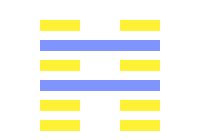
39.1.2.3.4.5.6 (39 > 38) - THE KIEN HEXAGRAM.
- 1. From the first line, divided, we learn that advance (on the part of its subject) will lead to (greater) difficulties, while remaining stationary will afford ground for praise.
- 2. The second line, divided, shows the minister of the king struggling with difficulty on difficulty, and not with a view to his own advantage.
- 3. The third line, undivided, shows its subject advancing, (but only) to (greater) difficulties. He remains stationary, and returns (to his former associates).
- 4. The fourth line, divided, shows its subject advancing, (but only) to (greater) difficulties. He remains stationary, and unites (with the subject of the line above).
- 5. The fifth line, undivided, shows its subject struggling with the greatest difficulties, while friends are coming to help him.
- 6. The topmost line, divided, shows its subject going forward (only to increase) the difficulties, while his remaining stationary will be (productive of) great (merit). There will be good fortune, and it will be advantageous to meet with the great man.
39.1.2.3.4.5.6 (39 > 38) - Enduring indifference
One continues to report even though others are not paying attention.
Bing DeepL Google Yandex39.1.2.3.4.5.6 (39 > 38) - Enduring indifference
One continues to report even though others are not paying attention.
Bing DeepL Google Yandex39.1.2.3.4.5.6 (39 > 38) - Kién, l’obstacle
Kién : Difficulté, danger, noble hardiesse.
-
1. Si l’on va (courageusement) aux choses difficiles, on reviendra comblé de louanges.
Il convient d’être ferme. - 2. Si le prince et ses ministres ont difficultés sur difficultés, ce n’est point (nécessairement) parce qu’ils recherchent leur propre avantage (ou : cela ne dépend pas nécessairement d’eux-mêmes).
- 3. L’un va aux difficultés et revient après au repos. Ou : qui va aux difficultés (courageusement) revient aux profits (en obtient).
-
4. Un autre y va et revient uni à ceux qui les ont partagées.
Il faut être fidèle dans ses fonctions. - 5. C’est dans les difficultés que les amis se montrent.
-
6. Un autre y va également et revient plus éclairé et intelligent.
Il a la juste mesure.
Un dernier y va de même et revient plein de mérite et de succès. Il atteint les qualités du grand homme.
39.1.2.3.4.5.6 (39 > 38) - Endurer l'indifférence
On continue ses rapports bien que les autres ne fassent pas attention.
Bing DeepL Google Yandex39.1.2.3.4.5.6 (39 > 38) - Bizonytalanság
- 1. Mások ellenállnak mert nem ellenőrizte, így közvetítőt kér hogy felülvizsgálják a munkáját.
- 2. Sok nehézség mások táplálásában.
- 3. Azt akarják hogy visszajöjjön.
- 4. A többiek nincsenek ott így várnia kell rájuk.
- 5. Problémák amiket nem oldhat meg egyedül, látogatókat kap amikor szükség van rájuk.
- 6. Kéri eltávolodott barátait hogy térjenek vissza.
Guide
La situation de départ

51.6 (51 > 21) - THE KĂN HEXAGRAM.
The topmost line, divided, shows its subject, amidst the startling movements (of the time), in breathless dismay and looking round him with trembling apprehension. If he take action, there will be evil. If, while the startling movements have not reached his own person and his neighbourhood, (he were to take precautions), there would be no error, though his relatives might (still) speak against him.
Bing DeepL Google Yandex51.6 (51 > 21) - Taking refuge in the heights
One has lost the weakest, so one keeps a low profile until they change.
Bing DeepL Google Yandex51.6 (51 > 21) - Taking refuge in the heights
One has lost the weakest, so one keeps a low profile until they change.
Bing DeepL Google Yandex51.6 (51 > 21) - Kán, l’ébranlement
Kán : tonnerre, effroi répandu, crainte.
Le tonnerre répand l’effroi et fait partout regarder avec trouble et crainte. S’il atteint et frappe, il causera un grand mal. (Ou : il corrige le mal.) Mais s’il ne frappe ni tel personnage, ni ses voisins, ce ne sera point un mal et fera seulement jaser les habitants d’une même maison.
Quand le tonnerre gronde, que l’orage éclate, le sage recherche la cause de ce fait (et tâche de profiter de l’avertissement céleste).
51.6 (51 > 21) - Se réfugier dans les hauteurs
On a perdu les plus faibles alors on reste discret jusqu'à ce qu'ils changent.
Bing DeepL Google Yandex51.6 (51 > 21) - Megrázkódtatás
Elvesztette a leggyengébbet, visszafogottnak kell maradnia míg nem változnak.
Bing DeepL Google YandexCorrection
La direction suivant laquelle le guide va plier
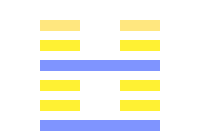
51.1.2.3.4.5 (51 > 48) - THE KĂN HEXAGRAM.
- 1. The first line, undivided, shows its subject, when the movement approaches, looking out and around with apprehension, and afterwards smiling and talking cheerfully. There will be good fortune.
- 2. The second line, divided, shows its subject, when the movement approaches, in a position of peril. He judges it better to let go the articles (in his possession), and to ascend a very lofty height. There is no occasion for him to pursue after (the things he has let go) ; in seven days he will find them.
- 3. The third line, divided, shows its subject distraught amid the startling movements going on. If those movements excite him to (right) action, there will be no mistake.
- 4. The fourth line, undivided, shows its subject, amid the startling movements, supinely sinking (deeper) in the mud.
- 5. The fifth line, divided, shows its subject going and coming amidst the startling movements (of the time), and always in peril ; but perhaps he will not incur loss, and find business (which he can accomplish).
51.1.2.3.4.5 (51 > 48) - Shock
One is proud to be able to tell others why one should do it like this.
Bing DeepL Google Yandex51.1.2.3.4.5 (51 > 48) - Shock
One is proud to be able to tell others why one should do it like this.
Bing DeepL Google Yandex51.1.2.3.4.5 (51 > 48) - Kán, l’ébranlement
Kán : tonnerre, effroi répandu, crainte.
- 1. Le tonnerre approchant, on est plein d’effroi ; puis, quand il est passé, on sourit et on parle tous ensemble (on passe de la crainte à la joie).
- 2. Quand le tonnerre gronde, le danger arrive, on croit devoir tout abandonner et se retirer en un lieu sûr et élevé. Qu’on ne s’obstine pas à rechercher alors ce qu’on a abandonné ; on le retrouvera quelque temps après. (Quand le danger sera passé.)
- 3. Le tonnerre émeut, agite ; il pousse à agir justement.
- 4. Le tonnerre approchant trouble et interdit [avant même l’éclair].
- 5. Le tonnerre allant et venant répand l’effroi ; mais on doit tâcher de ne pas abandonner les affaires entreprises. Même dans le danger pressant, on doit garder le milieu.
51.1.2.3.4.5 (51 > 48) - Le choc
On est fier de pouvoir dire aux autres pourquoi il faut faire comme ça.
Bing DeepL Google Yandex51.1.2.3.4.5 (51 > 48) - Megrázkódtatás
- 1. Nevethet miután meglátja.
- 2. Ne keresse ami elveszett.
- 3. Meglátva a szakadást otthagyja őket.
- 4. Meg kell szabadítania magát a többiektől mielőtt tovább mehetne.
- 5. Szilárdan áll a megrázkódtatás kezdetekor és végigkíséri a többieket míg véget nem ér.
Forum
Avez-vous besoin d'aide pour comprendre ce tirage ?
Rejoignez le forum et demandez de l'aide.
BBCode
Le BBCode ci-dessous est à votre disposition pour être copié-collé dans votre fil de discussion.
Link
Lien vers ce tirage

